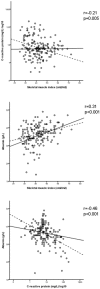The relationships between body composition and the systemic inflammatory response in patients with primary operable colorectal cancer
- PMID: 22870258
- PMCID: PMC3411715
- DOI: 10.1371/journal.pone.0041883
The relationships between body composition and the systemic inflammatory response in patients with primary operable colorectal cancer
Abstract
Background: Weight loss is recognised as a marker of poor prognosis in patients with cancer but the aetiology of cancer cachexia remains unclear. The aim of the present study was to examine the relationships between CT measured parameters of body composition and the systemic inflammatory response in patients with primary operable colorectal cancer.
Patient and methods: 174 patients with primary operable colorectal cancer who underwent resection with curative intent (2003-2010). Image analysis of CT scans was used to measure total fat index (cm(2)/m(2)), subcutaneous fat index (cm(2)/m(2)), visceral fat index (cm(2)/m(2)) and skeletal muscle index (cm(2)/m(2)). Systemic inflammatory response was measured by serum white cell count (WCC), neutrophil:lymphocyte ratio (NLR) and the Glasgow Prognostic Score (mGPS).
Results: There were no relationships between any parameter of body composition and serum WCC or NLR. There was a significant relationship between low skeletal muscle index and an elevated systemic inflammatory response, as measured by the mGPS (p = 0.001). This was confirmed by linear relationships between skeletal muscle index and both C-reactive protein (r = -0.21, p = 0.005) and albumin (r = 0.31, p<0.001). There was no association between skeletal muscle index and tumour stage.
Conclusions: The present study highlights a direct relationship between low levels of skeletal muscle and the presence of a systemic inflammatory response in patients with primary operable colorectal cancer.
Conflict of interest statement
Figures




References
-
- Bosanquet N, Sikora K (2004) The economics of cancer care in the UK. Lancet Oncol 5(9): 568–574. - PubMed
-
- Dewys WD, Begg C, Lavin PT, Band PR, Bennett JM, et al. (1980) Prognostic effect of weight loss prior to chemotherapy in cancer patients. Eastern Cooperative Oncology Group. Am J Med 69(4): 491–497. - PubMed
-
- Khalid U, Spiro A, Baldwin C, Sharma B, McGough C, et al. (2007) Symptoms and weight loss in patients with gastrointestinal and lung cancer at presentation. Support Care Cancer 15(1): 39–46. - PubMed
Publication types
MeSH terms
LinkOut - more resources
Full Text Sources
Medical
Research Materials

